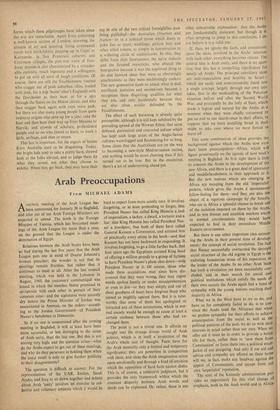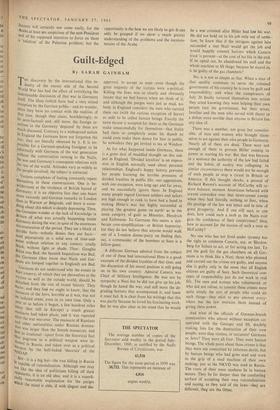Arab Preoccupations
From MICHAEL ADAMS ACOUNCIL meeting of the Arab League has been summoned for January 30 in Baghdad, and nine out of ten Arab Foreign Ministers are expected to attend. The tenth is the Foreign Minister of Tunisia, which has boycotted meet- ings of the Arab League for more than a year, on the ground that the League is under the domination of Egypt.
Relations between the Arab. States have been so bad during the last five years that the Arab League puts one in mind of Doctor Johnson's woman preacher; the wonder is not that its meetings remain fruitless, but rather that it Continues to meet at all. After the last council meeting, which was held in the Lebanon in August, 1960, the customary communiqud was issued in which the member States promised to co-operate with each other in pursuit of their common aims—and the signatures were scarcely dry before the Prime Minister of Jordan was assassinated in Amman, on the orders—accord- ing to the Jordan Government—of President Nasser's henchmen in Damascus.
So if no one is assassinated after the coming meeting in Baghdad, it will at least have been more successful, or less damaging to the cause of Arab unity, than the last one. But this is not aiming very high, and the question arises—what do the Arabs expect to get out of these meetings, and why do they persevere in holding them when the usual result is only to give further publicity to their disagreements?
The question is difficult to answer. For the representatives of the UAR, Jordan, Saudi Arabia and Iraq to sit down together and debate about Arab 'unity' involves an exercise in col- lective and voluntary amnesia which it would be hard to expect from more saintly men. It involves forgetting, or at least pretending to forget, that President Nasser has called' King Hussein a tool of imperialism, a lackey, a dwarf, a torturer and a liar; that King Hussein has called President Nas- ser a murderer; that both of them have called General Kassem a Communist, and accused him of practically every crime in the book—and that Kassem has not been backward in responding. It involves forgetting, to go a little further back, that four years ago the Egyptians accused King Saud of offering a million pounds to a group of Syrians to have President Nasser's plane shot down—with President Nasser in it. Of course, those who made these accusations may since have dis- covered that they were wrong, they may regret words spoken hastily or under misapprehension or even in jest—or they may simply and out of sheer goodness of heart have forgiven those who sinned so mightily against them. But it is note- worthy that none of them has apologised or retracted any of these accusations, which in nor- mal society would be enough to cause at least a certain coolness between those who had ex- changed them.
The point is not a trivial one. It affords an insight into the strange dream world of Arab politics, which is in itself a projection of the Arab's whole cast of thought. Facts have for the Arab mentality only a limited and temporary significance; they are powerless in competition with ideas, and ideas the Arab imagination seizes upon emotionally and through a kind of intuition which the opposition of hard facts cannot shake. This is, of course, a subjective judgment, but it provides the only framework within which the constant disparity between Arab words and deeds can be explained. Or, rather, there is one other conceivable explanation: that the Arabs are fundamentally insincere; but though it is often tempting to jump to this conclusion, I do not believe it is a valid one.
If, then, we ignore the facts, and concentrate upon the ideas, involved in the Arabs' relations with each other, everything becomes clearer. The central idea is Arab unity, and there is no ques- tion that this has a compelling significance for nearly all Arabs. The principal subsidiary ideas are anti-imperialism and hostility to Israel— which are easily and understandably fused into a single concept, largely through our own mis- takes, first in the mishandling of the Palestine situation before and after the Second World War, and principally by the folly of Suez, which made it logical and natural for the Arabs, at a moment when they were chiefly concerned to put an end to our interference in their affairs, to suppose that we were installing Israel in their midst to take over where we were forced to leave off.
This same combination of ideas provides the background against which the Arabs now view their latest preoccupation—Africa, which will figure prominently on the agenda of next week's meeting in Baghdad. At first sight there is little to concern the Arabs in the development of the new Africa, and there is a great deal of ignorance and muddleheadedness in their approach to it. But the new nations which are emerging in Africa are escaping from the old 'imperialist' pattern, which gives the Arabs a spontaneous fellow-feeling for them—and they are also the object of a vigorous campaign by the Israelis, who see in Africa a splendid chance to break out of the isolation imposed on them by the Arabs, and to win friends and establish markets which in normal circumstances they would have expected to find in their immediate Middle Eastern environment.
But there is one other important idea animat- ing the Arabs in their present state of develop- ment: the concept of social revolution. The fact that Nasser successfully overturned the decrepit social structure of the old regime in Egypt is the enduring foundation stone of his reputation as the leader of the Arabs. In no other Arab State has such a revolution yet been successfully con- cluded, and in their search for social and political institutions which satisfy the needs of their own society the Arabs again feel a bond of sympathy with the young nations reaching their majority in Africa.
What we in the West have to try to do, and have so far completely failed to do, is to con- vince the Arabs (and the Africans) that when we profess sympathy for their efforts to achieve emancipation from the social as well as the political patterns of the past, we do so with their interests in mind rather than our own. When we offer aid it must be in order to provide a better life for them, rather than to 'save them from Communism' or force them into a political strait- jacket of our designing. And only if our aid and advice and sympathy are offered on these terms will we, in fact, make any headway against the appeal of Communism, and escape from our own 'imperialist' reputation.
The start of the Kennedy administration pro- vides an opportunity for this vital change of emphasis, both in the Arab world and in Africa. Success will certainly not come easily, for the Arabs at least are suspicious of the new President and of his supposed intention to force on them a 'solution' of the Palestine problem; but the opportunity is the best we are likely to get. It can only be grasped if we show a much greater understanding of the problems and the inconsis- tencies of the Arabs.











































 Previous page
Previous page